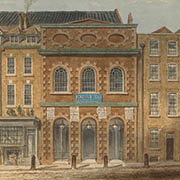The circumstances surrounding the composition of Handel’s opera Lucio Cornelio Silla are not clear. But because of its interesting characters and outstanding music, it deserves a new chance. The Handel Festival Halle is reviving the work this summer.
Less is known about the composition, casting and performance of Lucio Cornelio Silla, shortly to be published in the Hallische Händel-Ausgabe, than is the case with any other Handel opera. We do not even know whether it was performed at all at the time when it was composed; but the existence of a printed libretto by Giacomo Rossi, with a fulsome dedication to the Duc d’Aumont, the French Ambassador who was in London to negotiate the Treaty of Utrecht which ended the War of the Spanish Succession, shows that a performance was planned, probably for 2 June 1713, the date of the dedication, and the paper-type of the extant leaves of the autograph confirms a date in 1713; if there was a performance it is likely that it was a private affair at the Queen’s Theatre in the Haymarket. No other performances are known to have taken place until 1990, when it was staged in Paris, and since then there have been concert performances in Cologne, Halle, the Czech Republic, and finally in London in 2000. It will be staged this summer in the new edition as part of the Handel Festival in Halle.
The protagonist of the opera is the Roman Dictator Lucius Cornelius Sulla (spelt so in Latin, English and German), who lived from 138 to 78 B.C. History has depicted him as a ruthless tyrant who, after a struggle against his rival Marius, seized power in Rome and established a reign of terror, taking cruel revenge on his enemies, although he granted citizenship to thousands of slaves. He claimed that the massacres he undertook were dictated to him by a Goddess as he slept (dramatically portrayed in the second act of the opera, although here it is God with a bass voice). Ancient historians had little good to say about Sulla, but record that in the year 79 he concluded that his work was finished, suddenly resigned his offices and went into retreat on his estate at Puteoli, the modern Pozzuoli. He died there the following year at the age of 60. He loved and was loved by his wife Metella, but he was unfaithful to her and pursued other women; yet in the opera there are moments of tenderness between them: history is of course full of women who have loved and been loyal to unpleasant tyrants.
In his libretto Rossi has taken care to show a comic side to Silla, as he makes ludicrously unsuccessful advances towards the other two women in the story, Flavia and Celia. That the murderous psychopath is also ridiculous adds another dimension to his personality; the other characters in the drama, Silla’s friend Lepido, Flavia’s husband, his secret enemy Claudio, Celia’s lover, are depicted as normal people who are involved in their own relationships, but have to find their way through the tragic situation created by Silla’s tyrannical behaviour, when, for instance, he orders Lepido to divorce Flavia so that he can marry her himself.
A well-known feature of Baroque opera is the concluding scene known as the “lieto fine” or happy ending, which often seems absurd to a modern audience, as even the evil characters repent of their wickedness and everyone decides to love everyone else. It is ironic that in the case of Silla this conclusion reflects historical truth.
Only about half of Handel’s autograph has survived, but there are good secondary copies of the score, although some of the music is missing, and the editor, Terence Best, has adapted three movements from Handel’s other works.
There is much fine music in the work, including one of the most beautiful of those duets which we frequently find in Handel’s operas, in which two lovers who have been condemned to death (here Lepido and Flavia) express their mutual love as they believe they have to part for ever: it is an exquisite piece, “Ti lascio, idolo mio”, although only fourteen bars long; and there are many other fine movements. The new edition will surely find many friends among Handel enthusiasts.
Terence Best
(from [t]akte 1/2015)



